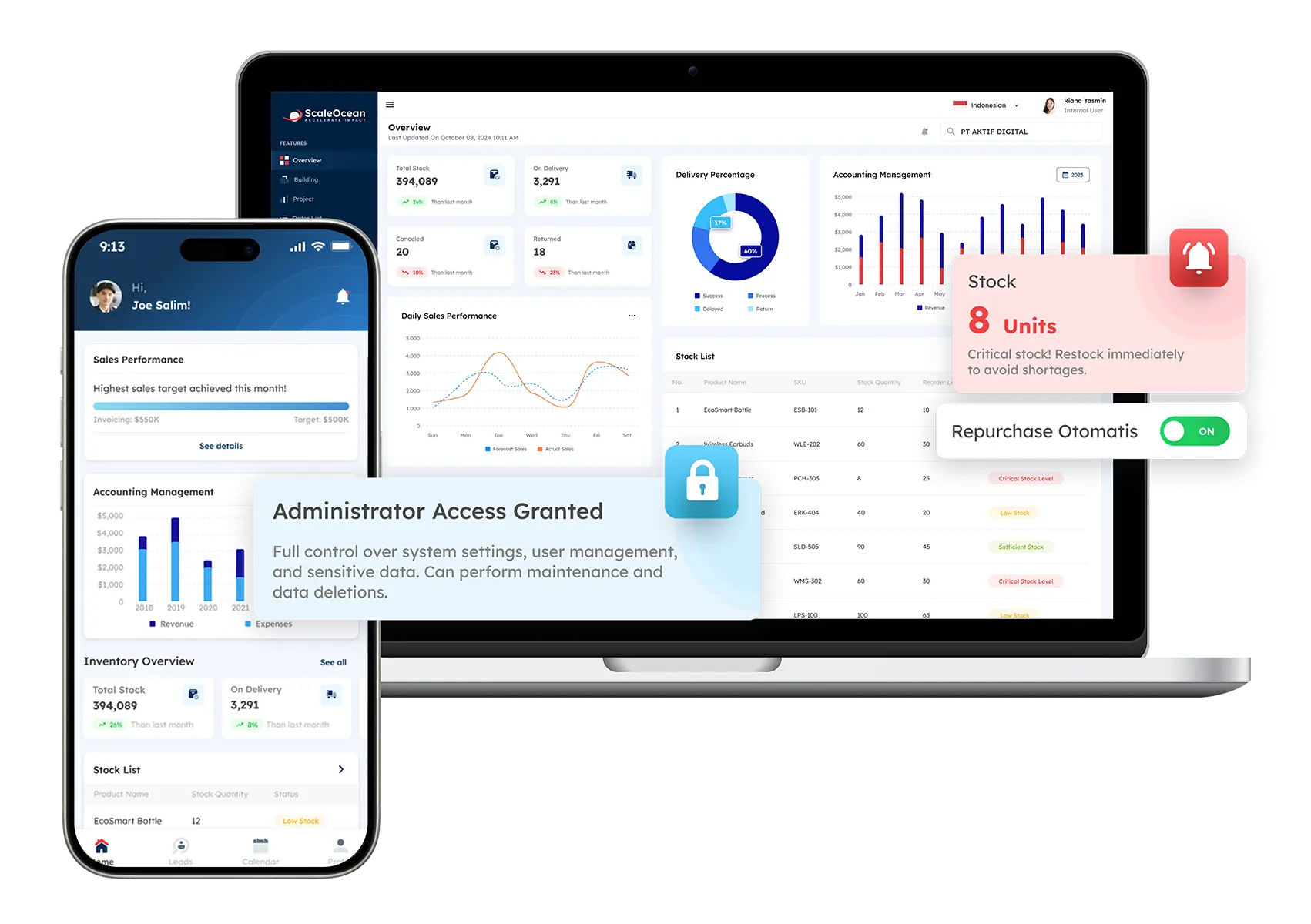Choosing the right ERP software can be a game-changer for companies aiming to streamline operations and boost productivity. The decision often boils down to custom-built vs. off-the-shelf ERP, depending on specific needs, budget, and long-term goals, enhancing integration and data visibility.
While custom ERP provides tailored solutions to meet specific requirements, off-the-shelf ERP offers faster deployment and proven reliability. Understanding the strengths and limitations of both options is crucial for making the right choice. In this post, we will elaborate on what is off an shelf ERP is and its differences to a custom ERP.
Custom ERP systems provide tailored solutions to meet specific business requirements, while off-the-shelf ERP offers faster deployment and proven reliability. A recent report from Statista highlights that the ERP market in Singapore is projected to exceed USD 938.61 million in 2024, with a CAGR of 12.7% through 2037.
This growth reflects the increasing adoption of off-the-shelf ERP solutions as businesses prioritize efficiency and cost-effectiveness in a digital economy. Understanding the strengths and limitations of both options is crucial for making the right choice. In this post, we will explore the differences between off-the-shelf and custom ERP.
- An ERP system is a system that integrates key business functions like finance, sales, and HR into a single solution, streamlining operations and enhancing decision-making.
- An ERP system has two types of ERP solutions, such as off-the-shelf ERP and custom ERP solutions, each offering different levels of flexibility, cost, and implementation processes.
- Key advantages for Off-the-shelf ERP systems are cost-effectiveness and quick deployment, but they may lack the customization required for specific business needs.
- ScaleOcean ERP offers a comprehensive, locally tailored solution with features that ensure compliance and smooth operations for Singaporean businesses.

What is an ERP System?
An ERP system integrates key business functions, like finance, sales, and HR, into a single software solution. It aims to streamline operations, ensure accurate data, and enhance decision-making. By centralizing information, companies can manage resources better and boost overall efficiency.
ERP systems are divided into three main approaches like off-the-shelf, custom, and hybrid solutions. Off-the-shelf solutions come pre-built for general use, while custom ERP solutions are tailored to specific business needs. A hybrid ERP combines both, offering flexibility with standard functionalities based on your company’s needs.
Why are ERPs Important for Business?
Enterprise Resource Planning (ERP) systems are crucial for businesses as they unify core processes like finance, inventory, HR, and customer management within a single platform. By providing real-time data and analytics, ERPs enhance decision-making, increase efficiency, and reduce operational costs.
They also promote seamless communication across departments, ensuring consistent workflows and minimizing errors. Successful ERP implementation can significantly improve these benefits, enabling businesses to optimize their operations.
ERP systems support scalability, making them ideal for growing businesses aiming to optimize resources. With automation, reporting, and compliance features, ERPs help organizations adapt to market changes and boost productivity. The impact of ERP system failures on businesses highlights the need for careful implementation.
Two Types of ERP Approach
When choosing an ERP system in Singapore, businesses essentially select between two main approaches like off-the-shelf or custom solutions. These options have significant differences in terms of implementation process, overall cost, and the flexibility they offer to meet specific business needs:
1. Off-the-Shelf ERP
Off-the-shelf ERP systems are pre-configured for rapid deployment, offering standardized features for a broad range of companies. Ideal for small to medium enterprises, they provide a quick, cost-effective solution with minimal customization. A two-tier ERP system can complement this for specialized needs.
These systems are typically more affordable and offer proven reliability due to widespread use. However, their lack of deep customization can challenge companies with highly unique operations. Despite this, off-the-shelf ERPs can often still be adapted through configurations and add-ons.
2. Custom ERP
Custom ERP software is a personalized enterprise resource planning system crafted to address the specific operational needs of a business. In contrast to generic ERP solutions that come with standard features, custom ERP software offers functionalities tailored to a company’s unique processes, industry standards, and growth goals.
The main advantage of custom ERP is that it is designed to fit a company’s exact needs, which often leads to improved efficiency. However, the complexity and higher initial cost of implementation, along with ongoing ERP maintenance, can be a barrier for businesses with limited resources.
Also Read: Understanding Cloud ERP and Its Benefits for Businesses
Advantages and Disadvantages of Off-the-Shelf ERP
Off-the-shelf ERP systems are pre-configured solutions offering rapid deployment and standardized features, making them an attractive choice for many businesses. However, like any software solution, they come with both advantages and disadvantages. Here’s a look at both sides:
1. Advantages
Off-the-shelf ERP systems are ideal for small to medium-sized enterprises with standard requirements. They offer cost-effectiveness, faster deployment, and reliability. These systems highlight the benefits of enterprise software, as they meet general industry needs efficiently.
These systems offer predefined features and functionalities that are already tested and proven. Businesses gain immediate access to a working solution, significantly cutting down on the time and resources that would typically be spent on customization or full development. Now, let’s explore the advantages in more detail:
- Cost-effective: Off-the-shelf ERP systems are less expensive upfront compared to custom-built systems, making them a viable option for small and medium-sized businesses with limited budgets.
- Quick implementation: With minimal setup required, these systems can be deployed rapidly, allowing businesses to streamline their operations without delays.
- Proven reliability: Due to their widespread use, off-the-shelf ERPs have undergone rigorous testing and refinement, ensuring their stability and performance across different industries.
2. Disadvantages
While off-the-shelf ERP systems offer great value, they simply can’t meet the unique needs of every business. Key limitations include inflexibility, restricted customization, and potential inefficiencies for businesses that operate with highly specialized or non-standard requirements.
For businesses with truly unique processes, the limited customization can become a significant drawback. Off-the-shelf solutions often require the company to adjust its unique workflows to fit the system, which can ultimately introduce costly inefficiencies into the operation. Here are the disadvantages in more detail:
- Limited customization: Off-the-shelf ERP systems are designed for general use, making it challenging to tailor them to fit the specific needs of a business.
- Less flexibility: These systems may lack the ability to scale or adapt as the business grows, potentially leading to issues down the line.
- Potential inefficiency: Because off-the-shelf solutions are built for many businesses, they may not fully optimize a company’s specific processes or workflows, leading to reduced productivity.
Advantages and Disadvantages of Custom ERP
Custom ERP systems are specifically tailored to meet the unique needs of a business, offering flexibility and adaptability. However, just like any system, they come with their own set of advantages and disadvantages. Let’s take a closer look:
1. Advantages
Custom ERP systems are tailored to a business’s specific needs, aligning with unique processes, workflows, and goals to enhance efficiency. However, according to GeeksforGeeks, this customization comes at a high cost due to the extensive development, testing, and ongoing maintenance required.
By designing a solution to fit exact requirements, businesses can truly optimize operations and sustain growth effectively. Custom ERPs also offer the flexibility needed to adapt the system as needs change over time, leading to significant improvements in performance and scalability. Here are the key advantages of custom ERP systems:
- Highly customizable: Custom ERP aligns with business processes for maximum efficiency, including seamless integration with 3PL services for optimized logistics and supply chain.
- Scalable: As businesses grow, custom ERP systems can be easily adjusted and expanded, ensuring they continue to meet evolving needs.
- Optimized efficiency: By adapting to business-specific requirements, a custom ERP helps streamline operations, reduce redundancies, and improve overall productivity.
- Improved Integration with Existing Systems: Custom ERP integrates smoothly with current systems, ensuring compatibility and reducing errors.
- Robust Data Security: Custom ERP includes advanced security like encryption and role-based access, ensuring data safety and compliance.
- Long-Term Vendor Support: Custom ERP offers dedicated vendor support, ensuring ongoing alignment with business goals and system updates.
- Competitive advantage: A custom-built system can give businesses an edge by providing specialized features not available in off-the-shelf solutions, enabling better decision-making and faster responses to market changes.
2. Disadvantages
While custom ERP offers significant benefits, businesses must prepare for certain challenges when choosing this solution. These hurdles often center around the high development effort and ongoing maintenance requirements. Let’s examine the main disadvantages in more detail now.
Custom ERP systems can be significantly more costly, largely due to the required development time and continuous maintenance. They also typically require much longer to fully implement compared to the ready-to-use, off-the-shelf alternatives. Now, let’s look at the disadvantages in more detail:
- High cost: The development, customization, and implementation of a custom ERP system can be expensive, making it a less viable option for businesses with limited budgets.
- Long implementation time: Custom ERP systems take longer to deploy due to the need for design, development, and testing, potentially delaying business operations.

Industries Applicable for Off-the-Shelf ERP Software
Off-the-shelf ERP software is versatile and serves a wide range of industries by providing standardized solutions for core processes. Its adaptability makes it ideal for diverse operational needs, with specific advantages and limitations to consider for your business. Here are industries that are applicable for Off-the-Shelf ERP:
1. Distribution
Off-the-shelf ERP systems are invaluable to distribution businesses by providing tools for inventory management and order tracking. These systems streamline supply chain processes, offering real-time updates on stock levels, shipments, and customer orders, ensuring smoother operations.
ERP software helps improve logistics efficiency by connecting warehouses, suppliers, and customers, allowing for faster deliveries. It also optimizes resource allocation, reducing delays and ensuring that inventory is managed effectively to meet customer demands.
2. Manufacturing
ERP systems play a crucial role in manufacturing by integrating production planning, scheduling, and quality control into one platform. This centralization ensures that resources are used efficiently, helping manufacturers maintain consistency and meet production targets.
These systems help reduce waste, optimize inventory, and provide real-time data to support decision-making. Manufacturers can streamline their operations, ensuring they meet deadlines, reduce downtime, and maintain high product quality with minimal resource wastage.
3. Healthcare
In the healthcare industry, ERP software simplifies administrative tasks like managing patient records, billing, and inventory tracking for medical supplies. It ensures better accuracy and efficiency by centralizing information, making it easier for healthcare professionals to manage day-to-day operations.
ERP solutions also help healthcare providers maintain regulatory compliance and improve resource utilization. By offering real-time data across departments, the software supports better decision-making and enhances patient care, contributing to improved operational outcomes.
4. Education
Educational institutions benefit from ERP software by streamlining student data, staff records, and financial operations. These systems automate scheduling, registration, and reporting, freeing administrative staff for more critical tasks. The importance of ERP finance modules lies in enhancing financial management and accuracy.
With centralized data management, ERP software improves communication between departments and enables better decision-making. Educational institutions can enhance their operational efficiency, simplify compliance, and provide a more organized experience for students, staff, and faculty.
5. Construction
ERP systems in the construction industry help manage project planning, resource allocation, and budgeting. These systems enable real-time monitoring of project progress, ensuring that timelines are met and costs are tracked efficiently, leading to better project management.
The integration of ERP software enhances team coordination, allowing construction companies to collaborate effectively and manage their resources. By providing accurate data, these systems help optimize project workflows, ensuring that construction projects are completed on time and within budget.
Industries Applicable for Custom ERP Software
Custom ERP software offers deep adaptability, providing tailored solutions for unique industry needs. Its flexibility lets businesses create systems that align with exact processes, ensuring smooth management of work in progress. Here are industries where custom ERP software proves beneficial:
1. Aerospace & Defense
In the aerospace and defense industries, custom ERP systems are essential for managing complex projects, regulatory compliance, and intricate supply chains. These industries require highly specialized ERP solutions to ensure precision, safety, and compliance with international standards.
Custom ERP software in this sector enables seamless integration with multiple systems, managing everything from manufacturing to logistics and documentation. These systems also support real-time monitoring and tracking, helping companies optimize their operations while adhering to strict industry regulations.
2. Energy & Utilities
Energy and utilities companies rely on custom ERP software to manage large-scale infrastructure projects, regulatory compliance, and resource allocation. These industries often require unique workflows, complex data integration, and tailored features for efficient energy production and distribution.
Custom ERP systems allow for deep integration with existing technologies and workflows, offering enhanced visibility into operations. By providing real-time data and predictive analytics, these solutions help companies manage resources, reduce operational costs, and improve decision-making for future growth.
3. Real Estate & Property Management
Real estate and property management companies benefit from custom ERP systems to handle property listings, leasing, sales, and maintenance workflows. These systems can be tailored to manage a variety of property types and track tenant information, ensuring smooth operations across portfolios.
Custom ERP software can integrate with other real estate tools like accounting, CRM software, and project management systems. By automating tasks and streamlining processes, these solutions boost efficiency and improve data access, allowing companies to focus on growth and customer satisfaction.
4. Legal & Professional Services
Legal and professional services firms require custom ERP systems to manage case files, client billing, compliance, and document management. These businesses often have specialized needs, requiring systems that can accommodate complex workflows and support real-time communication.
With a custom ERP, firms can automate routine tasks like billing, track case progress, and ensure compliance with regulations. SaaS ERP implementation further enhances this by providing scalable, cloud-based solutions that allow law firms and professional services to improve client service and internal operations.
5. High-Tech & IT Services
The high-tech and IT services industries often face rapidly changing technology and evolving business models. Custom ERP software in this field allows companies to handle product development, project management, resource allocation, and customer support in a highly dynamic environment.
Custom ERP solutions in IT services help businesses maintain a competitive edge by automating repetitive tasks, managing resources, and improving collaboration. These systems are highly customizable, making them ideal for fast-paced industries where change and innovation are constant.
How to Choose The Right ERP for Your Business?
Choosing the appropriate ERP software is important for business success. A thorough strategy guarantees that the system meets your requirements, facilitates growth, and successfully optimizes operations. Below, we have outlined the most important criteria to consider when choosing the best ERP solution for your company:
1. Identify Business Needs and Goals
Start by reviewing your business processes, pain points, and objectives. Understand your company’s specific needs, such as automation, reporting, or industry-specific functionalities, to ensure the ERP system aligns with operational demands.
Custom ERP allows you to tailor features to fit your business, while off-the-shelf ERP provides standardized solutions. Off-the-shelf systems may not meet unique requirements, but custom-built options ensure your specific goals are achieved efficiently. Integrating mobile ERP adds flexibility and accessibility to your system.
2. Consider Scalability and Flexibility
Choose an ERP system that can scale with your business growth. Ensure it supports an expanding user base, larger data volumes, and additional modules while adapting to new business requirements over time.
Custom ERP systems are highly scalable, allowing businesses to adjust as needed. Off-the-shelf ERP solutions, while cost-effective, may require costly upgrades as your business grows, potentially limiting flexibility when scaling to meet new demands.
3. Evaluate Integration Capabilities
Examine how well the ERP integrates with your existing systems, like CRM, accounting software, or supply chain tools. Strong integration capabilities ensure smooth workflows and improve data sharing. The features of ERP consolidation further enhance this by streamlining processes across departments.
Custom ERP solutions fully integrate with your current tools, creating a seamless flow of information. Off-the-shelf ERP systems offer integration options, but their limited flexibility requires additional customization or third-party plugins for full integration.
4. Assess Vendor Reputation and Support
Research the vendor’s credibility, customer reviews, and industry experience. Opt for a provider with a solid track record, reliable customer service, and regular system updates to ensure long-term satisfaction and stability.
With a custom ERP, the vendor relationship is critical, as you’ll rely on their expertise for ongoing support and updates. Off-the-shelf ERP vendors typically provide more structured support, but the customization options and flexibility may not be as extensive as with custom solutions.
5. Compare Total Costs of Ownership (TCO)
Consider all costs, including licensing, implementation, training, and ongoing maintenance. When evaluating different ERP systems, according to TechTarget, it’s essential to assess the total cost of ownership to ensure the solution is cost-effective, fits within your budget, and provides value with no hidden costs.
Custom ERP systems often have higher upfront costs but offer long-term savings through better efficiency and tailored solutions. Off-the-shelf ERP solutions are more affordable initially, but they may incur additional costs for customization or add-ons to meet specific needs.
ScaleOcean Singapore, The Best ERP Choice for Your Business
In the current business landscape, selecting the right ERP software is crucial for optimizing operations and enhancing productivity. ScaleOcean ERP provides a comprehensive solution specifically designed to cater to the unique needs of Singaporean enterprises.
Its intuitive accounting module simplifies financial management by automating transaction recording, seamlessly integrating with other modules, and generating precise reports that comply with local regulations.
This software is particularly adept at supporting Singaporean businesses by ensuring adherence to local compliance standards and facilitating smooth operations across various sectors. Companies can explore their capabilities through a free demo, allowing them to see how ScaleOcean can transform their business processes effectively.
Key Features of ScaleOcean ERP:
- Unlimited Users: No additional cost per user, enabling access for all departments and employees without constraints.
- Easy Customization: Adapt features, integrate with other systems, or tailor user interfaces to meet specific business needs effortlessly.
- Integrated Modules: Seamlessly connect inventory, sales, purchasing, and production processes for holistic management.
- Bank Integration-Auto Reconciliation: Automatically match internal bookkeeping with bank transactions for real-time accuracy.
- Multi-level Analytical Reports: Comprehensive insights into financial performance, customizable by project or branch.
- Industry-Specific Adaptability: Designed for industries such as F&B, retail, manufacturing, and construction.
ScaleOcean ERP boosts efficiency by unifying business functions in one platform. It assures scalability, automates tasks, boosts efficiency, and allows for real-time decision making. It provides seamless business operations and long-term value through configurable features, compliance assurance, transparent pricing, and exceptional support.
8. Conclusion
Choosing the right ERP can transform your business by streamlining operations and boosting productivity. Custom ERPs offer tailored solutions but require more time and money. Conversely, off-the-shelf options are ready-to-use, quicker to deploy, and cost-effective, despite having less deep customization.
To select the best ERP, start by assessing your company’s operational needs and future goals. ScaleOcean ERP provides a comprehensive, scalable platform with integrated modules and intuitive accounting software. Try a free demo to see how it can optimize your processes and ensure compliance.
FAQ:
1. What is the difference between custom development and ERP?
Custom development involves creating software that is specifically designed to meet the unique needs of a business, whereas ERP (Enterprise Resource Planning) integrates various business functions like finance, sales, and HR into one unified system, streamlining operations.
2. What are the four types of ERP?
The four types of ERP are on-premise ERP, cloud ERP, hybrid ERP, and industry-specific ERP. On-premise ERP is installed locally, cloud ERP is hosted on the internet, hybrid ERP combines both methods, and industry-specific ERP is customized for particular industries.
3. How to make custom ERP?
1. Assess business processes and determine requirements.
2. Choose an appropriate technology stack.
3. Design a simple, intuitive interface.
4. Develop the necessary business modules.
5. Ensure integration with existing systems.
6. Perform testing, implement the system, and train users.
4. What are the three core ERP components?
1. Finance/Accounting: Manages all financial data, transactions, and reporting.
2. Human Resources: Administers employee information, payroll, and hiring processes.
3. Supply Chain/Inventory Management: Oversees procurement, stock management, and distribution logistics.













 PTE LTD..png)
.png)

.png)








.png)
.png)
















